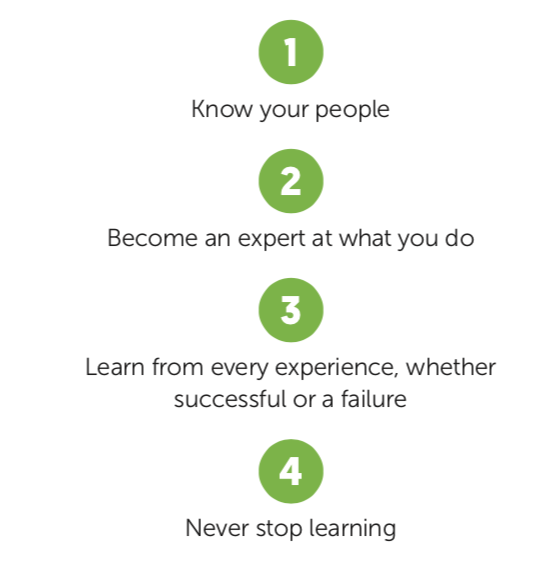It’s time to relearn the art of expertise, writes William A Cohen
Peter Drucker uncovered an uncomfortable truth. He found that many professionals failed because they spent more time on office politics than they did on knowing what they were supposed to know.
It is unfortunately true that some otherwise skilled professionals don’t know their stuff to the extent that they should, and don’t seem much to care about their lack of knowledge. Their emphasis is less on being or becoming an expert and learning their trade, than on getting ahead. This leads to a focus on office politics and other aspects of the management scene, rather than expertise and good performance.
Some management books fall into this trap when advising their readers. They fail to emphasize that a leader becomes a real leader only when everyone recognizes that the leader knows what to do when he or she gets ahead, not because the leader knows how to get ahead.
People don’t follow others because leaders are good at office politics. They follow leaders because they are good at what they do. There is no substitute for a leader investing his or her time in becoming an expert. As an article in Fortune proclaimed: “Forget about fighting over titles and turf – it’s what you know (and how you use it) that really counts.”

The four aspects of knowing your stuff
Peter Drucker knew that there were four main aspects to knowing your stuff. To really master your stuff, you had to know all four.
1 Know your people as individuals
Regardless of your job, you have an awful lot to learn about your people. Moreover, there are a lot of people to know. The list includes those that may report to you, those at your level, and those in other organizations that you work with including in other companies, those higher up in the organization including your boss and, of course, your customers. Whew! That’s quite a job. Moreover, each person is different and has a unique way of doing things. This fact constitutes one of the most fascinating, yet challenging, aspects of your knowing your stuff about them.
Every single one thinks differently and may be motivated to action by different stimuli. Psychologist Carl Jung found that, faced with the exact same situation, each of us have our preferred ways of acting, decision-making, or getting a job done. The best way to get the job done depends largely on expertise. So everyone should strive to become expert at what they do.
2 Becoming an expert may be easier than you think
When researchers investigated how long it took to become an expert in any field, they discovered that it generally took about five years. Of course, this probably varies somewhat depending on the field, and how you define expert. It took the filmmaker Steven Spielberg much longer – although the fact that his success came at an early age made it appear that it took much less time than it did.
Steven Spielberg is arguably the most successful moviemaker of our time. Spielberg was only in his twenties when he directed the immensely successful movie Jaws. Spielberg didn’t stop with one big hit. This is the man who made science-fiction thrillers like Close Encounters of the Third Kind, sensitive movies like ET, adventure thrillers such as Raiders of the Lost Ark, serious movies including The Color Purple and Schindler’s List, and movies of spectacular technical effects such as Jurassic Park.
How did Spielberg accomplish all this at such an early age? Parents with connections in the movie industry? Not quite. His father was an electrical and computer engineer; his mother a concert pianist. They got divorced when Spielberg was still in his teens shortly after they moved to California.
Maybe Spielberg went to a great graduate film school like the University of Southern California (USC) in nearby Los Angeles? Then, he was hired right into a high-paying director’s job. Right? Wrong! In fact, Spielberg applied to USC twice. And, he got turned down twice. USC probably regrets that decision dearly today.
No, Spielberg’s secret was that he took the time to become an expert at what he wanted to do. While only 12, he got his hands on an 8mm movie camera and began to turn out home movies starring relatives and friends. He decided right then on his life’s goal: he wanted to make movies.
A year later, he won a prize for writing a fully scripted war movie. At the age of 16, he made a real 140-minute science-fiction movie. It cost $500. He persuaded a local cinema to run it as a favour. It must not have been a great movie because it only ran once. But that didn’t bother Spielberg, because he was gaining expertise along the way.
While he was waiting to receive the second of two rejections from the USC film school, he was accepted at what was then California State College, Long Beach, and graduated in 1970 with a BA in English. Because of his determination, he was offered a small unpaid intern job at Universal Studios with the editing department. He later was allowed to make a short 26-minute film for theatrical release.
At age 22, he borrowed $15,000 from a friend and made a short film. It won some awards and came to the attention of a vice-president of Universal Studios. That vice-president immediately recognized Spielberg’s talent and expertise. After watching the film, he hired Spielberg as a director on a seven-year contract. Spielberg had become an expert. He knew his stuff, and his many successes followed.
3. Learn from every experience, even failures
During World War I, Winston Churchill was First Lord of the Admiralty and engineered the disastrous Gallipoli campaign because he believed it would outflank the German forces and end the war sooner. But it failed after a horrendous loss of life and Churchill resigned his safe civilian post, went into the Army and volunteered for frontline duty where the danger was the greatest. Everyone thought that it would permanently end his political career. But as you know if you watched the movie Darkest Hour, he became Prime Minister and he not only led the UK when it stood alone against Hitler early in World War II, he held things together until things could be turned around. Today many credit him with having saved everything, even Western civilization. It’s good to remember his words when you think your project will end in failure: “Success is not final, failure is not fatal: it is the courage to continue that counts.”
4. Never stop learning
If you think that you have learned all you’ll ever need to know for your career, you’re making a big mistake – and I don’t care at what point you are in your career, a new hire, or the president. New ways of doing things are always being developed. Technology changes. The business environment is constantly changing and is usually different as you become involved with new companies, industries, or geographical areas. I remember hearing one new college graduate proclaiming: “I’ll never need to read another book again.” Boy was he wrong!
Drucker learned that “a successful organization that continues to do what made it successful in the past will eventually fail” because of some kind of change. Change makes what an organization knew or did to achieve success in the past irrelevant or even wrong. And this goes for everything.
So, you must learn to keep up with change. You must consider innovative approaches and new techniques with every task or project that you are assigned. It’s all part of knowing your stuff.

